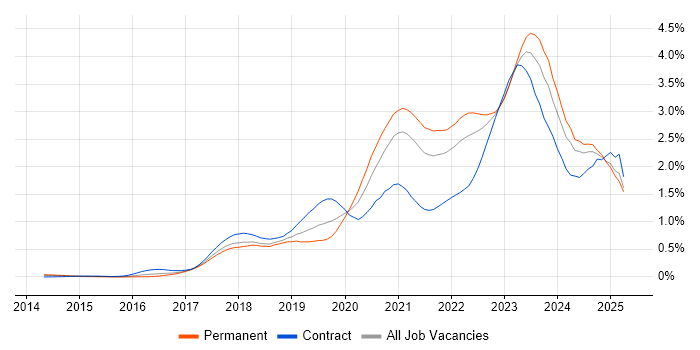Infrastructure as Code (IaC, Infra as Code)
England > South West
The table below provides summary statistics and salary benchmarking for jobs advertised in the South West requiring Infrastructure as Code skills. It covers permanent job vacancies from the 6 months leading up to 4 March 2026, with comparisons to the same periods in the previous two years.
| 6 months to 4 Mar 2026 |
Same period 2025 | Same period 2024 | |
|---|---|---|---|
| Rank | 107 | 93 | 91 |
| Rank change year-on-year | -14 | -2 | +13 |
| Permanent jobs citing Infrastructure as Code | 83 | 80 | 198 |
| As % of all permanent jobs in the South West | 1.35% | 2.52% | 2.83% |
| As % of the Processes & Methodologies category | 1.90% | 2.82% | 3.25% |
| Number of salaries quoted | 63 | 62 | 141 |
| 10th Percentile | £42,500 | £40,625 | £48,750 |
| 25th Percentile | £48,125 | £51,313 | £51,716 |
| Median annual salary (50th Percentile) | £62,500 | £70,996 | £65,050 |
| Median % change year-on-year | -11.97% | +9.14% | +8.42% |
| 75th Percentile | £75,625 | £83,750 | £81,500 |
| 90th Percentile | £97,250 | £91,125 | £87,500 |
| England median annual salary | £75,000 | £75,000 | £75,000 |
All Process & Methodology Skills
South West
Infrastructure as Code falls under the Processes and Methodologies category. For comparison with the information above, the following table provides summary statistics for all permanent job vacancies requiring process or methodology skills in the South West.
| Permanent vacancies with a requirement for process or methodology skills | 4,370 | 2,835 | 6,087 |
| As % of all permanent jobs advertised in the South West | 70.91% | 89.40% | 87.01% |
| Number of salaries quoted | 2,967 | 1,450 | 4,770 |
| 10th Percentile | £28,250 | £30,738 | £29,000 |
| 25th Percentile | £35,000 | £41,250 | £37,500 |
| Median annual salary (50th Percentile) | £50,000 | £55,000 | £50,000 |
| Median % change year-on-year | -9.09% | +10.00% | -3.69% |
| 75th Percentile | £68,750 | £70,000 | £65,000 |
| 90th Percentile | £80,000 | £82,500 | £78,750 |
| England median annual salary | £55,000 | £62,500 | £55,000 |
| % change year-on-year | -12.00% | +13.64% | -12.00% |
Infrastructure as Code
Job Vacancy Trend in the South West
Historical trend showing the proportion of permanent IT job postings citing Infrastructure as Code relative to all permanent IT jobs advertised in the South West.

Infrastructure as Code
Salary Trend in the South West
Salary distribution trend for jobs in the South West citing Infrastructure as Code.

Infrastructure as Code
Salary Histogram in the South West
Salary distribution for jobs citing Infrastructure as Code in the South West over the 6 months to 4 March 2026.
Infrastructure as Code
Job Locations in the South West
The table below looks at the demand and provides a guide to the median salaries quoted in IT jobs citing Infrastructure as Code within the South West region over the 6 months to 4 March 2026. The 'Rank Change' column provides an indication of the change in demand within each location based on the same 6 month period last year.
| Location | Rank Change on Same Period Last Year |
Matching Permanent IT Job Ads |
Median Salary Past 6 Months |
Median Salary % Change on Same Period Last Year |
Live Jobs |
|---|---|---|---|---|---|
| Gloucestershire | +15 | 31 | £56,250 | -6.25% | 31 |
| Bristol | -21 | 16 | £73,750 | +1.72% | 29 |
| Somerset | - | 11 | £45,000 | - | 7 |
| Wiltshire | +1 | 6 | £65,000 | -7.14% | 6 |
| Devon | -3 | 5 | £52,500 | -19.23% | 4 |
| Dorset | -11 | 3 | £67,500 | -27.03% | 3 |
| Cornwall | -11 | 3 | - | - | |
| Infrastructure as Code England |
|||||
Infrastructure as Code
Co-Occurring Skills & Capabilities in the South West by Category
The following tables expand on the one above by listing co-occurrences grouped by category. They cover the same employment type, locality and period, with up to 20 co-occurrences shown in each category:
|
|
||||||||||||||||||||||||||||||||||||||||||||||||||||||||||||||||||||||||||||||||||||||||||||||||||||||||||||||||||||||||||||||
|
|
||||||||||||||||||||||||||||||||||||||||||||||||||||||||||||||||||||||||||||||||||||||||||||||||||||||||||||||||||||||||||||||
|
|
||||||||||||||||||||||||||||||||||||||||||||||||||||||||||||||||||||||||||||||||||||||||||||||||||||||||||||||||||||||||||||||
|
|
||||||||||||||||||||||||||||||||||||||||||||||||||||||||||||||||||||||||||||||||||||||||||||||||||||||||||||||||||||||||||||||
|
|
||||||||||||||||||||||||||||||||||||||||||||||||||||||||||||||||||||||||||||||||||||||||||||||||||||||||||||||||||||||||||||||
|
|
||||||||||||||||||||||||||||||||||||||||||||||||||||||||||||||||||||||||||||||||||||||||||||||||||||||||||||||||||||||||||||||
|
|
||||||||||||||||||||||||||||||||||||||||||||||||||||||||||||||||||||||||||||||||||||||||||||||||||||||||||||||||||||||||||||||
|
|
||||||||||||||||||||||||||||||||||||||||||||||||||||||||||||||||||||||||||||||||||||||||||||||||||||||||||||||||||||||||||||||
|
|||||||||||||||||||||||||||||||||||||||||||||||||||||||||||||||||||||||||||||||||||||||||||||||||||||||||||||||||||||||||||||||
